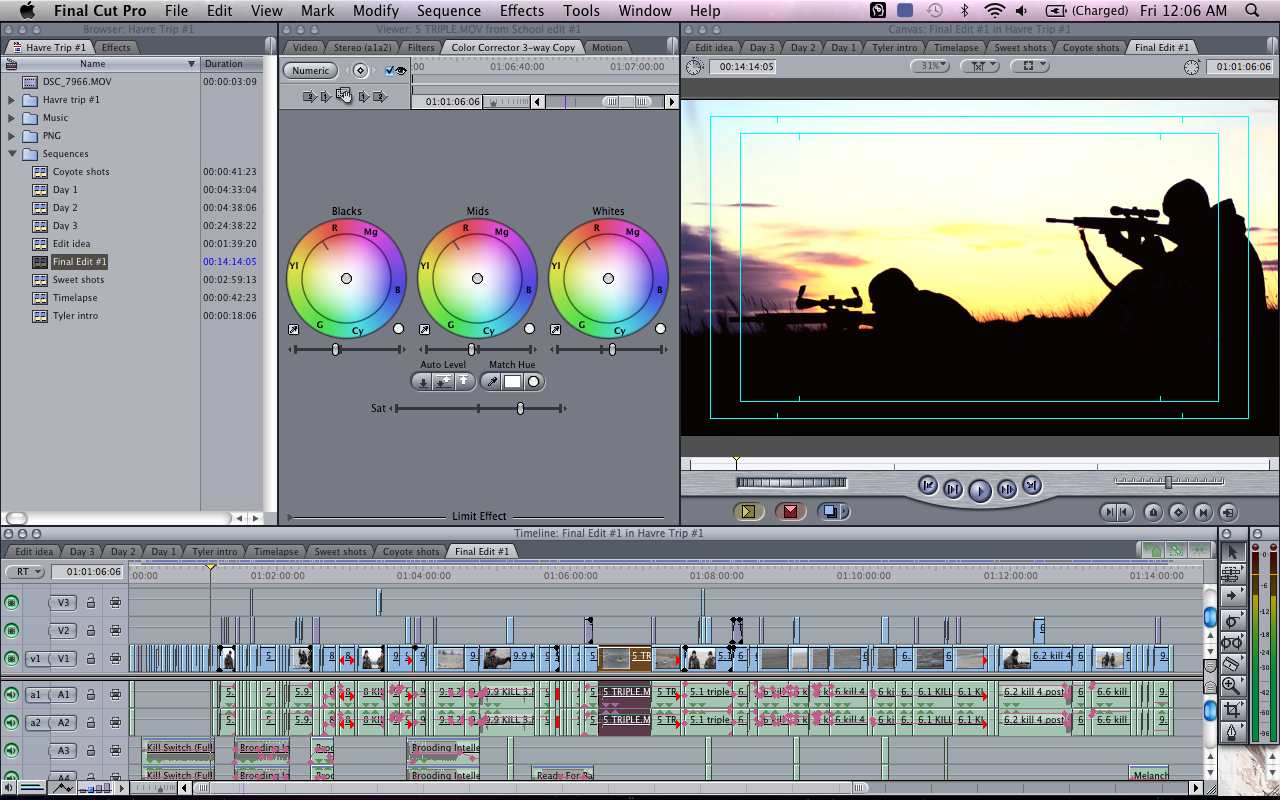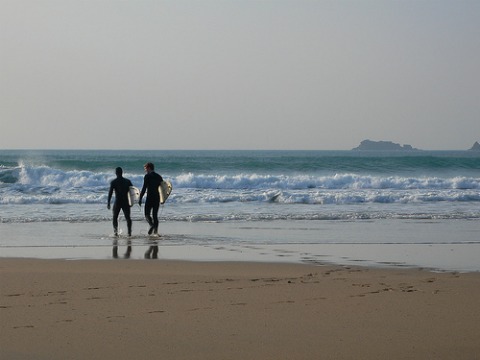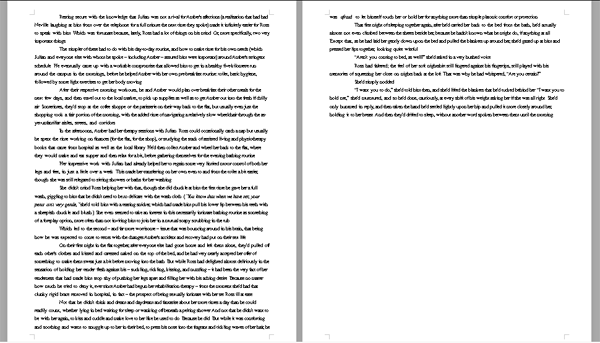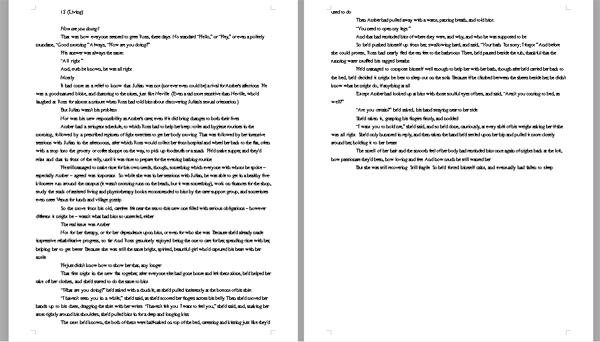by Mayumi-H | Aug 11, 2012 | Persona 4 Fan Fiction, Process
I follow a lot of people on Twitter. Most of them, I follow for fun: they’re insightful, amusing, friendly folk. But some are on my “understanding the business of writing” list: agents, editors, writers, publishers. Some of these people offer the same insightful, amusing, friendly 140-character glimpses into their daily lives that the others do. But, lately, I’ve seen a trend of negativity in this latter crowd that makes me wonder if I’m right for this want-to-be-published storytelling game.
One person offered up a tweet that was basically, “Don’t send me your manuscript if…” Another said, “Don’t expect me to read your book if…” A third mentioned, “Don’t even think of querying me if…”
Many of these “don’ts” are valid, valuable points to know and understand…but I’ve gotten a bit fed up with seeing so many “don’ts” all over the place. As someone who’s chosen an art (storytelling) for a personal outlet, I’ve had to deal with a lot of naysaying and doubts already, and it does very little for one’s sense of self-worth to be told “Don’t” all the time.
So, I’ve decided to share in this space my list of “dos.” Hopefully, at least one of these will help you get through your slower days.
- Do be engaged with your own story. Love it, to help it grow beyond those scratchings of loose plot outlines and vague character sketches.
- Do respect your readers’ intelligence. The good ones want and deserve a story worth the time of picking up and reading.
- Do finish your story, even if that first ending isn’t all you’d hoped and dreamed. Qualification and strength of your story will come from revision, but you can only get to the point of revision if you manage to finish the story first.
- Do try your best. You will be more proud and pleased with your story if you know you’ve given it your all. Other people will see it, too!
- Do listen to critique. You won’t be able to please everyone, of course, but any well-thought critique is worth considering.
- Do remember that this is your story. Write it for you, first. If your goal is publishing and making millions, you may have to revise parts (or all) of it…but it should always remain your story at its core.
And, most importantly:
![Surfer_girl_(2_of_2) By Thomas Tolkien (Flickr: Surfer girl (2 of 2)) [CC-BY-2.0 (http://creativecommons.org/licenses/by/2.0)], via Wikimedia Commons](https://mayumi.amorphous.press/wp-content/uploads/sites/4/2012/08/256px-surfer_girl_2_of_2.jpg)
I had to link to this in honor of my surf mentor, Fiona. 🙂
Photo by Tom Tolkien.
by Mayumi-H | Jul 30, 2012 | Excerpts, Fearless, Process
A friend of mine asked to read my latest project, which happens to be Fearless. I don’t usually share my work with people I trust so early in the game, but I offered him the first two (draft) chapters, mostly just to shut him up.
It didn’t.
What I got back was an earful. He made some good points, but this had to be my favorite critique: The best friend is more likable than the hero. To quote: “Your hero’s a jerk.”
That one actually made me grin. Because yes, he is. But, that’s a big part of the story.
One of the things I love about my main characters is that they’re flawed. Some more than others, of course, but I try to help them all grow. That’s the beautiful thing about heroes and heroines. They’re like you and me (sometimes scarily so), but, over the course of the story, they push themselves to be better people. They don’t always get what they want, but they’re stronger men and women for the effort.
Which is why it’s so much fun to write them as jerks in the beginning:
Ross felt a grin creep to his face. Then he raised his free arm and called out, “Mornin’, Beth!”
Neville clicked his tongue, muttering, “Grow up.”
Ross ignored him, swinging his board up as he approached both fruit and filly. He bent his head, offering the Crispins’ youngest daughter a leering smile. “You look as scrumptious as those apples!” he told her.
Beth laughed and blushed bright red under her kerchief. “Thank you,” she said, her voice mostly squeal.
It took some effort for Ross to keep his smile in place; hopefully, that voice would one day mature as nicely as her tits had already done. Still, he wasn’t interested in her, just the apples, so he offered her a charming flare of his nostrils and asked, “Think you could let us have a taste?”
What do you like best about your main character(s)? Are they the ones who grow over the story, or do they spur the growth in others?
by Mayumi-H | Jun 30, 2012 | Fearless, Process
Perhaps that title is a bit misleading….
I recently started preliminary planning for a documentary project, and, as I did, I got to thinking about why I like to do what I like to do when it comes to video production. I’ve spent a good portion of my professional (job) life working with video, and much of that has to do with production. But, while I once fancied myself an actor, I’ve come to enjoy being behind the scenes more than being in front of a camera. Video production involves many steps, and many skills, but the one which I favor most doesn’t happen in production, at all. It happens in post-production: editing.

This is kind of my life.
I’ve edited lots of projects in my time: some small, some not. What I think I love most about that process, though, is that I get to be the one telling the story.
If you think about it, the editor has final input into how the story – especially one in video – plays out. We control the angles, the cuts, the music – all of the details, conscious and subliminal. And that controls how the audience views the characters, the conflict, and the outcome. A simple focus frame on a character’s face (whether they’re speaking or not) can give completely different meaning to a scene. That guy doing the intro for “The Outer Limits” was not kidding; we (editors, that is) control everything.
[youtube http://www.youtube.com/watch?v=8CtjhWhw2I8?rel=0&w=420&h=315]
It’s the same in writing, too, I think. The editor – whether that’s you doing your first edit or your professional editor doing the final one – controls what the reader sees, how they view the story. The editor doesn’t actively write any of the words of the story, though. Not in my experience, anyway. They help tell the story without writing the words, guiding the writer’s hand and vision with cuts, suggestions, and insight.
We video editors do the same thing. We’re given rough footage, where plot, point, characterization can go one of any number of ways. And, when we’re finished, assuming we’ve done our job right and well, the audience gets a story. Hopefully a good one. But marked by our hands, no matter that.
I’m excited to work with an editor for my first real novel. I’m scared, too; I’ve never put such a huge work – such a gigantic chunk of myself – out there for someone else to tear down. But I want to build a better story than I could do alone. I just hope I get an editor who’s as careful and conscientious as I try to be.
Have you worked with a professional editor before? Was it a good fit, or a not-so-good one? What did you learn from that process?
by Mayumi-H | Jun 25, 2012 | Excerpts, Fearless, Process
Sometimes, we write little moments and interactions that we love…but they serve no extra purpose to the overall story. For me, this represents one of those moments:
Ross snorted and laughed in the same breath, at once recalling that afternoon on the beach when he’d been just shy of twenty-one, freshly returned from Torpoint and eager to be a civilian again, free to ride the waves, with Neville sitting beside him in the sand. And how Neville had started to have The Talk with him, only to be interrupted by Ross’s pointed and unconcerned recognition of the reason behind his friend’s mumbling and hawing:
“Are you trying to tell me that you’re gay?” Ross had asked, with some impatience.
Neville had stared at him for a long pause of time, his expression unreadable. Then he’d murmured, quite quietly: “…Yeah.”
Ross had considered that for a moment, then asked: “Do you fancy me?”
“Wh-?” Neville had sputtered, as he’d given a quick shake of his head. “God, no! You’re a breeder…!”
“Well, then, no worries, mate,” Ross had told him then, hitting him in the shoulder with the back of his hand before forcing himself to his feet. “Now, come on; I want to catch some waves before supper.”
And that had been the end of the discussion, so far as Ross had been concerned. Neville was simply Neville; and if his friend being gay meant that Ross didn’t have to compete with him (handsome, stylish, good-guy Neville) for the attentions of any pretty girls in the village, all the better.
So the very thought that their friendship could be about anything more than the mutual platonic interests in their surfing or the shop made Ross laugh again.

I really like the flashback exchange that happens between Ross and Neville, but it’s unnecessary explanation. By the time this flashback occurs, the reader should already know that Ross and Neville are good friends, and each one’s sexual preference has no bearing on that friendship.
Readers are free to read into text what they want, of course, and Ross’s perspective might even be different from Neville’s. But to take valuable reader time to make that explanation seemed like a lot of extra words, no matter how much I enjoyed the flow of them.
Have you ever edited out a scene or conversation that you really liked? Did you agree with that decision? Or, did you regret it?
by Mayumi-H | Jun 4, 2012 | Fearless, Persona 4 Fan Fiction, Process
I read somewhere that it can be helpful to take a step back and just look at your work. Not from an artistic perspective or a storytelling or an editing one, but from a visual one. The idea is that, if every page looks the same (whether it’s big blocks of text or lots of lines of dialogue), you may need to switch up your storytelling style a bit. It’s just another subtle way of keeping your readers’ attention, I guess.
So, on a recent revision of my manuscript, that’s what I did. I took a step back, and looked at the first page and a half of a chapter.
I have to point out, here, that the reason I did this was because I was leery about starting another chapter with a lot of textual explanation, as I’d done the last chapter. Anyway, here’s what the initial draft looked like:

The original start to Chapter 15.
Whoa. What a wall of text. It’s necessary text, though. There’s a fair amount of explanation that happens, to set up the minor conflict of this chapter. But there’s already a lot of description and setup that happens in the surrounding chapters, and I didn’t want to subject the reader to having to read these huge intros every time.
So, here’s the second draft:

The revised Chapter 15 start. Looks nicer, yes?
All I did differently was break up the blocks of description and explanation with some more personal insight from my main character, answering questions from other people. The same information is offered, but it’s broken up into what I consider more manageable pieces.
And, doesn’t it look a little nicer to read, too?
I’m not afraid to read lush description, but sometimes you just need to change it up, for sake of your reader’s eyes. What about you? Would that wall of text have scared you off? Do you find it helpful to look at your stories in a visual way?
![Surfer_girl_(2_of_2) By Thomas Tolkien (Flickr: Surfer girl (2 of 2)) [CC-BY-2.0 (http://creativecommons.org/licenses/by/2.0)], via Wikimedia Commons](https://mayumi.amorphous.press/wp-content/uploads/sites/4/2012/08/256px-surfer_girl_2_of_2.jpg)

![Brocken Inaglory [CC-BY-SA-3.0 (http://creativecommons.org/licenses/by-sa/3.0) or GFDL (http://www.gnu.org/copyleft/fdl.html)], via Wikimedia Commons](http://upload.wikimedia.org/wikipedia/commons/thumb/8/86/Falling_surfer.jpg/256px-Falling_surfer.jpg)




Recent Comments